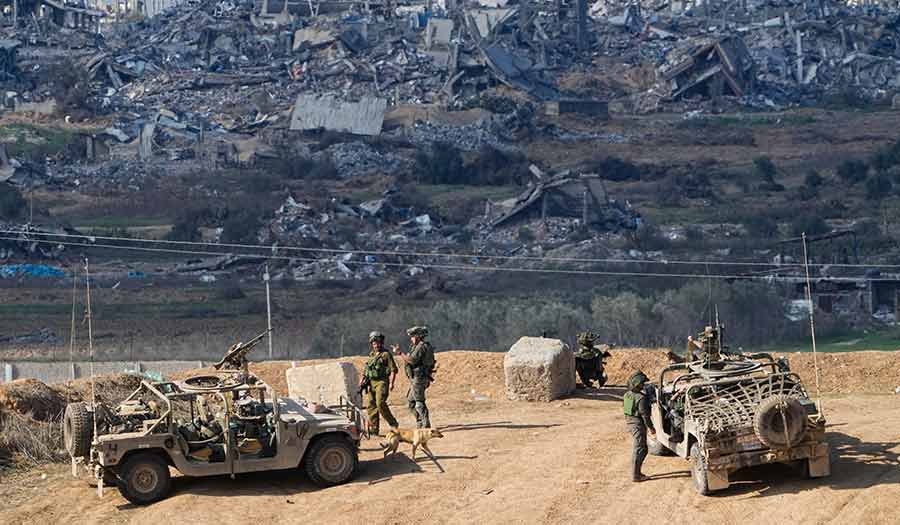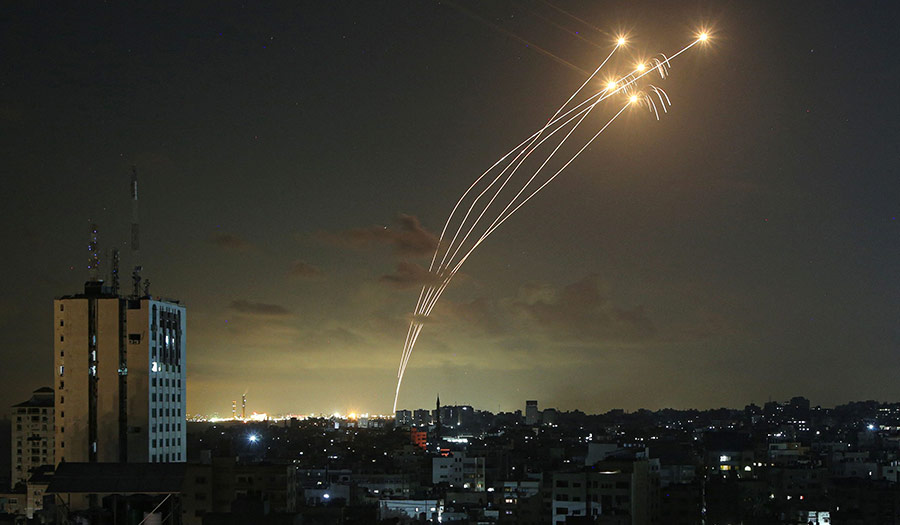 AP/Ariel Schalit
AP/Ariel Schalit
World News Desk
Learn the why behind the headlines.
Subscribe to the Real Truth for FREE news and analysis.
Subscribe NowJERUSALEM (AP) – Last Sunday marked 100 days that Israel and Hamas have been at war.
The war already is the longest and deadliest between Israel and the Palestinians since Israel’s establishment in 1948, and the fighting shows no signs of ending.
Israel declared war in response to Hamas’ unprecedented cross-border attack on October 7 in which the Islamic militant group killed some 1,200 people, mostly civilians, and took 250 others hostage. It was the deadliest attack in Israel’s history and the deadliest for Jews since the Holocaust.
Israel responded with weeks of intense airstrikes in Gaza before expanding the operation into a ground offensive. It says its goal is to crush Hamas and win the release of the more than 100 hostages still held by the group.
The offensive has wrought unprecedented destruction upon Gaza. But more than three months later, Hamas remains largely intact and hostages remain in captivity. The Israeli military says the war will stretch on throughout 2024.
Here are five takeaways from the first 100 days of a conflict that has upended the region.
Israel Will Never Be the Same
The October 7 attack blindsided Israel and shattered the nation’s faith in its leaders.
While the public has rallied behind the military’s war effort, it remains deeply traumatized. The country seems to be reliving October 7—when families were killed in their homes, partygoers gunned down at a music festival and children and older people abducted on motorcycles—every day.
Posters of the hostages who remain in Hamas captivity line public streets, and people wear T-shirts calling on leaders to “Bring Them Home.”
Israeli news channels devote their broadcasts to round-the-clock coverage of the war. They broadcast nonstop tales of tragedy and heroism from October 7, stories about hostages and their families, tearful funerals of soldiers killed in action and reports from Gaza by correspondents smiling alongside the troops.
There is little discussion or sympathy over the skyrocketing death toll and deteriorating humanitarian situation in Gaza. Plans for postwar Gaza are rarely mentioned.
One thing has remained constant. While chastened Israeli security officials have apologized and signaled that they will resign after the war, Prime Minister Benjamin Netanyahu remains firmly entrenched.
Despite a sharp drop in his public approval ratings, Mr. Netanyahu has resisted calls to apologize, step down or investigate his government’s failings for allowing the events of October 7 to take place. Mr. Netanyahu, who has led the country for almost all of the past 15 years, says there will be a time for investigations after the war.
Historian Tom Segev said the war will shake the country for years, and perhaps generations, to come. He said the failures of October 7 and the inability to bring the hostages home have fomented a widespread feeling of betrayal and lack of faith in the government.
“Israelis like their wars to go well. This war doesn’t go so well,” he said. “Lots of people have the feeling that something very, very deep is wrong here.”
Gaza Will Never Be the Same
Conditions before October 7 were already difficult in Gaza after a stifling blockade imposed by Israel and Egypt following Hamas’ takeover in 2007. Today, the territory is unrecognizable.
Experts say the Israeli bombing is among the most intense in modern history. Gaza health authorities say the death toll already has eclipsed 23,000 people, roughly 1 percent of the Palestinian territory’s population. Thousands more remain missing or badly wounded. Over 80 percent of the population has been displaced, and tens of thousands of people are now crammed into sprawling tent camps on small slivers of space in southern Gaza that also come under Israeli fire.
Jamon Van Den Hoek, an Oregon State University mapping expert, and colleague Corey Scher of the City University of New York’s Graduate Center, estimate that roughly half of Gaza’s buildings have likely been damaged or destroyed, based on satellite analysis.
“The scale of likely damage or destruction across Gaza is remarkable,” Mr. Van Den Hoek wrote on LinkedIn.
The human cost is equally mind-boggling. The United Nations estimates that about one-quarter of Gaza’s population is starving. Just 15 of Gaza’s 36 hospitals are partially operational, according to the UN, leaving the medical system close to collapse. Children have missed months of school and have no prospects for returning to their studies.
“Gaza has simply become uninhabitable,” wrote Martin Griffiths, the UN’s humanitarian chief.
It’s All Connected
The war has rippled across the entire Middle East, threatening to escalate into a broader conflict pitting a U.S.-led alliance against Iranian-backed militant groups.
Almost immediately after the Hamas attack, Iranian-backed Hezbollah militants in Lebanon began striking Israel, triggering Israeli retaliatory attacks.
The back-and-forth fighting between Israel and Hezbollah has not erupted into a full-blown war. But it has come perilously close, most recently after a January 2 airstrike blamed on Israel that killed a top Hamas official in Beirut. Hezbollah responded with heavy barrages on Israeli military bases, while Israel has assassinated several Hezbollah commanders in targeted airstrikes.
At the same time, Iranian-backed Houthi rebels in Yemen have carried out a series of attacks on civilian cargo ships in the Red Sea. Meanwhile, Iranian-backed militias have attacked U.S. forces in Iraq and Syria.
The United States has dispatched warships to the Mediterranean and Red Seas to contain the violence.
Late last Thursday, the U.S. and British militaries bombed more than a dozen Houthi targets in Yemen. The Houthis vowed to retaliate, raising the prospect of an even wider conflict.
Israel Cannot Ignore the Palestinians
Throughout his time in office, Mr. Netanyahu has repeatedly attempted to sideline the Palestinian issue.
His administration has rejected various peace initiatives, dismissed the internationally recognized Palestinian Authority as weak or irrelevant, and promoted policies that left Palestinians divided between rival governments in Gaza and the West Bank.
The Hamas attack, along with a spike in violence in the West Bank, has put the Israeli-Palestinian conflict back on center stage. The war now tops newscasts worldwide, has prompted four visits by U.S. Secretary of State Antony Blinken to the region and resulted in a genocide case against Israel in the UN world court.
The Saudis have revived the possibility of establishing ties with Israel, but only if this included the establishment of an independent Palestinian state.
“The painful developments of the last 100 days have proven beyond doubt that the Palestinian issue and the Palestinian people cannot be ignored,” said Nabil Abu Rudeineh, spokesperson for Palestinian President Mahmoud Abbas.
There Is No Postwar Plan
As the war drags on and the death toll mounts, there is no clear path for when the fighting will end or what will follow.
Israel says Hamas can play no part in Gaza’s future. Hamas says that is an illusion.
The U.S. and the international community want a revitalized Palestinian Authority to govern Gaza, and steps toward a two-state solution. Israel objects.
Israel wants to maintain a long-term military presence in Gaza. The U.S. does not want Israel to reoccupy the territory.
Reconstruction will take years. It is unclear who will pay for it or how the required materials will enter the territory through its limited crossings.
- Real Truth Magazine Articles
- MIDDLE EAST
 Israel vs. Hamas: 4,000 Years in the Making
Israel vs. Hamas: 4,000 Years in the Making
More on Related Topics:
- IAEA Chief: Iran Is Poised to ‘Quite Dramatically’ Increase Stockpile of Near Weapons-grade Uranium
- What Is Blocking a Ceasefire Between Israel and Hezbollah?
- UN Nuclear Agency’s Board Condemns Iran for the 2nd Time This Year for Failing to Fully Cooperate
- Traumatized by War, Hundreds of Lebanon’s Children Struggle with Wounds Both Physical and Emotional
- Five Things to Know About Israel’s Attack on Iran


